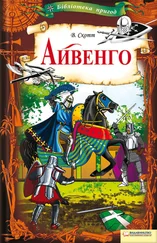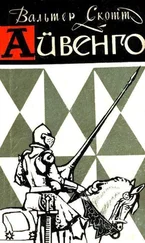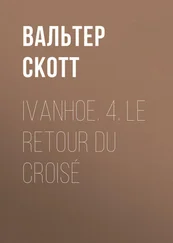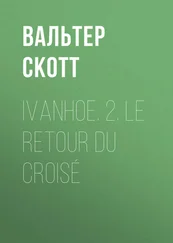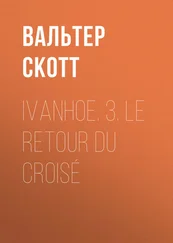“Is there any chance of rescue?” asked Cedric.
“Chance? Five hundred men are outside this castle and they are ready to attack. So farewell, my master, and good luck. Remember your faithful fool.”
The tears stood in Cedric’s eyes.
“You will never be forgotten,” he said, “but I hope I will save you all. Wait, I don’t know Latin, how will I pretend to be a monk?”
“You need only two words,” replied Wamba, “‘Pax vobiscum’. These words will open every door.”
On his way to the hall of the castle, Cedric was interrupted by a female form.
“Come this way, father,” – said the harsh voice of Urfried, “you are a stranger in this castle, and need a guide. Come here, I want to speak with you.”
* * *
Urfried led Cedric into a small apartment and shut the door. Then she took a bottle of wine and two cups from a cupboard and put them on the table. “You are Saxon, father—Don’t deny it,” she said, “I love to hear the sounds of my native language.”
“Do not Saxon priests visit this castle, then?” replied Cedric.
“They don’t come,” answered Urfried, “but you are a Saxon priest, and I have one question to ask of you.”
“I am a Saxon,” answered Cedric, “but unworthy, surely, of the name of priest. Let me go—I swear I will return, or send one of our fathers more worthy to hear your confession.”
“Stay,” said Urfried; “I will soon be dead, but I don’t want to die without confession. Wine must give me strength to tell my horrible story.” She poured wine in the two cups. “Drink it, father, if you want to hear my story without falling to the floor.” Cedric didn’t want to drink, but the woman seemed impatient and he decided to do what she asked. Then she began her story.
“I was born free, father,” she said, “I was happy, was honoured, loved, and was beloved. I am now a miserable slave. Is it strange, father, that I hate people? Can the old hag before you forget she was once the daughter of the noble lord of Torquilstone?”
“You are Ulrica, the daughter of Torquil Wolfganger!” said Cedric; “you—the daughter of that noble Saxon, my father’s friend and ally!”
“Your father’s friend!” echoed Ulrica; “then Cedric called the Saxon stands before me, because noble Hereward of Rotherwood had only one son. But if you are Cedric of Rotherwood, why this religious dress?”
“It matters not who I am,” said Cedric; “go on, unhappy woman, with your story of horror and guilt.”
“There is,” answered the poor woman, “deep, black, heavy guilt. – Yes, in these halls, where my father and brothers died, I lived as a mistress of their killer! I lived with him, but I didn’t love him. No, with that at least I cannot reproach myself—I hated Front-de-Boeuf. And I have had my vengeance—because of me the wild son killed his tyrant father in a drunken quarrel!”
“And what happened to you, creature of guilt and misery,” said Cedric, “when that tyrant was dead?”
“Don’t ask me. – Here I lived and grew old before my time.”
“Ulrica,” said Cedric, “I am no priest, but I tell you: repent. Pray and repent, and may be your prayers will be accepted! But I cannot, I will not, stay here any longer.”
“Stay a little!” said Ulrica; “remember, I can call Front-de-Boeuf if I am too upset by your words.”
“Do it,” said Cedric; “and let him tear me apart, before I say one word which my heart does not believe. I will die a Saxon—true in word, open in deed. – The sight of Front-de-Boeuf himself is less odious to me than you, degraded and degenerate as you are.”
“Be it so,” said Ulrica, no longer interrupting him; “go your way, you have destroyed the last tie which seemed to unite me to mankind. But your words have awakened a new soul within me. Well have you said, all is possible for those who dare to die! There is a force outside this accursed castle—lead them to the attack, and press the Normans hard, they will then have enough to do within. Go, follow your own fate, and leave me to mine.”
At this moment they heard the voice of Front-de-Boeuf saying, “Where is this priest?” Ulrica left through another door, and Reginald Front-de-Boeuf entered the apartment. Cedric made himself bow to him.
“I have a task for you,” said the baron.
“Speak your commands,” said Cedric.
“Follow me, then.”
As they went, Front-de-Boeuf told pseudo monk to make the attacking forces stay near the castle and in the meanwhile to go to the castle of Philip de Malvoisin, give him a letter from the baron and ask him to send a man with it to York.
They passed the moat and reached a small barbican. “Go now,” said the baron and opened the gate.
When Front-de-Boeuf returned, he ordered to bring him Cedric of Rotherwood and his companion. His servants brought the two Saxon captives. They could not see Wamba’s face from under his cap and there was little light in the room, so they didn’t know about Cedric’s escape.
“Nobles of England,” said Front-de-Boeuf, “if you don’t pay me a lot of money, I will hang you up by the feet from these windows, until you die! – Tell me how much you will pay for your lives? – What do you say, you of Rotherwood?”
“Not a coin,” answered Wamba—“and they say my brain has always been upside down, so if you hang me by my feet you may by chance fix it.”
“Saint Genevieve!” said Front-de-Boeuf, “what have we got here?”
He struck Cedric’s cap from the head of the Jester, and discovered the silver collar round his neck.
“I think I can tell you,” said De Bracy, who just entered the apartment. “This is Cedric’s clown. But that means that Cedric escaped in the monk’s cloak!”
“And I showed him the way out myself!” exclaimed Front-de-Boeuf, “Then destruction is near to us, and we have no way of communication with our friends.”
He looked out from the window, saw the enemy and commanded his men to their posts on the walls.
* * *
When Ivanhoe fainted, and seemed to be abandoned by all the world, it was Rebecca who persuaded her father to have the young knight transported from the lists to their house in Ashby. It was not difficult, because he was naturally kind and grateful.
“Holy Abraham!” he exclaimed, “he is a good man, and must not bleed to death. Let Seth and Reuben bear him to Ashby.”
“No, let them place him in my litter,” said Rebecca; “I will ride one of the horses.”
“Everybody will see you,” whispered Isaac, but Rebecca was already busy with her task.
Isaac’s fears however were not without reason, and the generous behavior of his daughter exposed her, on her return to Ashby, to the eyes of Brian de Bois-Guilbert.
The Jews were famous as doctors in that age, and the monarchs and powerful barons often needed their services. Beautiful Rebecca had studied medicine under an old Jewish woman called Miriam, the daughter of one of their best doctors, who loved Rebecca as her own child. Miriam had become a victim of the Christian fanatics, but her secrets had survived in her pupil. Rebecca was universally respected and admired by her own people. Even her father was often guided by her opinion.
When Ivanhoe was brought to Isaac’s house, he was still unconscious because of the loss of blood. Rebecca examined the wound and informed her father that if fever could be avoided, there was no reason to fear for his guest’s life, and that he might with safety travel to York with them on the next day. Isaac was going to leave the knight at Ashby. To this, however, Rebecca opposed many reasons, two of which persuaded Isaac. One was that she would not give the precious balsam into the hands of another doctor even of her own tribe, the other – that this wounded knight, Wilfred of Ivanhoe, was a favourite of Richard, and that, in case the monarch returns, Isaac, who had supplied his brother John with money, would need a powerful protector before Richard’s face.
Читать дальше
Конец ознакомительного отрывка
Купить книгу

